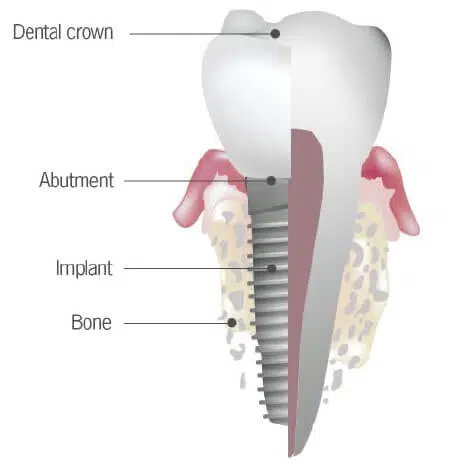Are There Differences Between Teeth and Dental Implants?

Although dental implants have high success rates in the mouth and are a great option to replace missing teeth they are not without problems. This article will address structural differences between teeth and dental implants and how that can affect their long-term stability.
Do Bone and Gum Attach Differently to a Tooth vs a Dental Implant?
Natural teeth have more fibers that help it to attach to the bone and gum as compared to a dental implant. In addition, the fibers are oriented in a way that make them stronger than the fibers that attach a dental implant to the bone and gums. Because of this the likelihood of tissue breakdown when faced with a bacterial challenge is more likely with dental implants. Seeing a periodontist to get professional cleanings and good home hygiene is very important for people with dental implants to avoid bone and gum tissue breakdown.
Tissue Around Dental Implants Are More Likely to Become Inflamed
When bacteria contaminate a dental implant not only is the tissue around dental implants weaker but the inflammatory response a person mounts to the bacteria is much greater. Dental implants will develop gum disease and peri-implantitis much faster and more severe than natural teeth. The immune system has a much greater reaction to contaminated implants than contaminated teeth and gum and bone tissue can break down in a faster period of time. It therefore becomes very important to see a periodontist and get treatment early when you have an implant infection.
Is the Healing Ability of Teeth Different Than Dental Implants After Treatment?
The blood supply around dental implants is less than that of natural teeth. Due to the decreased blood supply around implants compared with teeth, the healing after nonsurgical and/or surgical therapy is slower. Tissue repair around diseased implants is not as predictable as it is around teeth and more growth factors, proteins, and/or stem cells may need to be added when repairing diseased implants.
Natural Tooth Roots Can Handle Bite Stress Better Than Dental Implants
Teeth have a shock absorber in the form of a ligament (called the periodontal ligament) that acts as a suspension system, transferring forces from your bite to the surrounding bone in a distributed fashion. Implants do not have a periodontal ligament so forces are transferred to parts of the implant itself and pinpoint areas on the bone. Implants, therefore, are more likely to have mechanical breakdown such as dental implant screw loosening, fracture, and bone loss. Any type of excessive bite stress, chewing on ice, chewing on pencils, teeth grinding, or teeth clenching can be much more damaging to a dental implant than a natural tooth.
Bacteria Attach to the Dental Implant Stronger Than a Tooth Root
Because the surface of a dental implant is rough and porous bacterial contamination of the implant body versus the root surface is higher. Removing the bacteria once it contaminates a dental implant is much harder when compared to a tooth. A periodontist may use a laser or other instruments to remove the bacteria around a dental implant prior to rebuilding the damaged bone and gum tissue. In addition, recent studies have shown that the surface of the dental implant can breakdown and corrode leading to bleeding, swelling, and pain. Removal of these breakdown particles are also very important prior to attempting to rebuild any lost bone or gum tissue.
